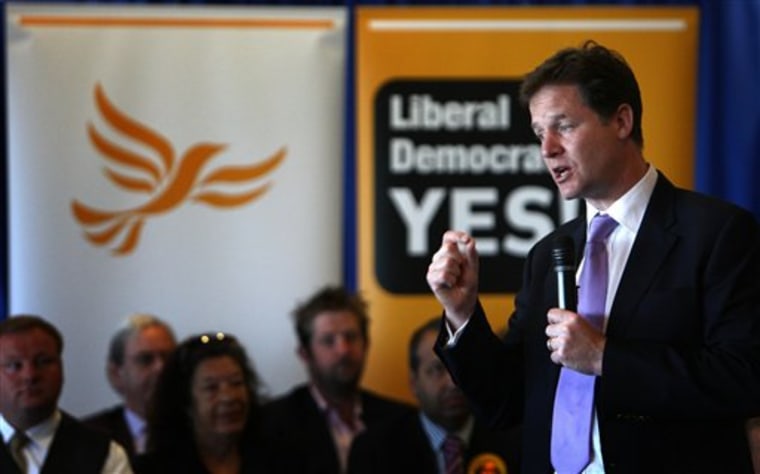British voters must decide whether to ditch decades of ballot box tradition or go Hollywood in parliamentary elections by adopting the same voting method used for the Academy Awards.
The campaign ahead of Thursday's national referendum has elements of a blockbuster: Sworn political foes banding together, stormy bust-ups across the Cabinet table, rising tensions in the country's most important bromance — the alliance between Prime Minister David Cameron and his deputy Nick Clegg.
Offering voters a chance to usher in electoral reform is a long-held ambition of Clegg's Liberal Democrats — who joined with Cameron's larger Conservative Party in a coalition government following last year's inconclusive national election.
A change to Alternative Voting — AV — would generally favor the Liberal Democrats, the perpetual third-place party, while usually reducing the number of seats won by the biggest parties, the Conservatives and Labour.
AV is used in parliamentary elections in Australia, Fiji and Papua New Guinea, in Ireland for elections to select the country's president — but perhaps most famously to pick winners of the Oscars.
Britain currently uses a first-past-the-post system, under which the candidate with the most votes — not necessarily an absolute majority — wins a seat in the House of Commons.
Under proposals being put to voters, Britain would switch to a system which asks electors to rank candidates in preference order.
50 percent bar
If no candidate clears 50 percent of first choice votes, the last-place candidate is eliminated and the second choices of his or her supporters are distributed. The process continues until one candidate clears the 50 percent bar.
Opponents of the current system — including Clegg and Ed Miliband, leader of the main opposition Labour Party — argue that the current system is unfair, particularly in a country where voters are increasingly likely to cast votes for smaller parties and poll results are less clear cut.
In Britain's national election last year, the Conservatives who now lead the government got 36 percent of the vote but 47 percent of the seats in the House of Commons; Labour got 29 percent of the vote but nearly 40 percent of seats.
The Liberal Democrats, despite getting 23 percent of the votes, got just 9 percent of the seats.
Though it promises the most radical change to the voting system since women won the right to vote in 1928, many members of the public are unmoved, or simply confused.
"I'll vote," said Clara Lloyd, a 32-year-old social worker from Machynlleth, Wales. "But without really knowing what I am voting for."
The vote on Thursday takes place alongside elections for English townhalls and assemblies in Scotland, Wales and Northern Ireland.
Nationalists set for victoryIn Scotland, polls put the Scottish National Party on course for victory.
, predicted the SNP would get 59 seats, with Labour on 42, the Conservative Party on 12, Scottish Green Party on eight, the Liberal Democrats on seven and with one independent in the 129-seat parliament.
If the poll is correct, STV News said, a majority of lawmakers in the 129-strong parliament would be in favor of holding a referendum on independence from the U.K.
In Northern Ireland, voters will cast their verdict on the power-sharing agreement between political parties associated with the Protestant and Catholic communities, Forbes.com reported.
The family of a young Catholic police recruit, Ronan Kerr, who was killed a month ago by a bomb placed under his car by an IRA splinter group, appealed to people to vote in a statement, the magazine's website reported.
"By not voting, we are giving the men of violence control and power over our lives. By exercising our democratic right to vote, we are condemning violence, ensuring power-sharing and mutual respect, and supporting law and order in our country," said the statement from the dead officer's mother, brothers and sisters.
